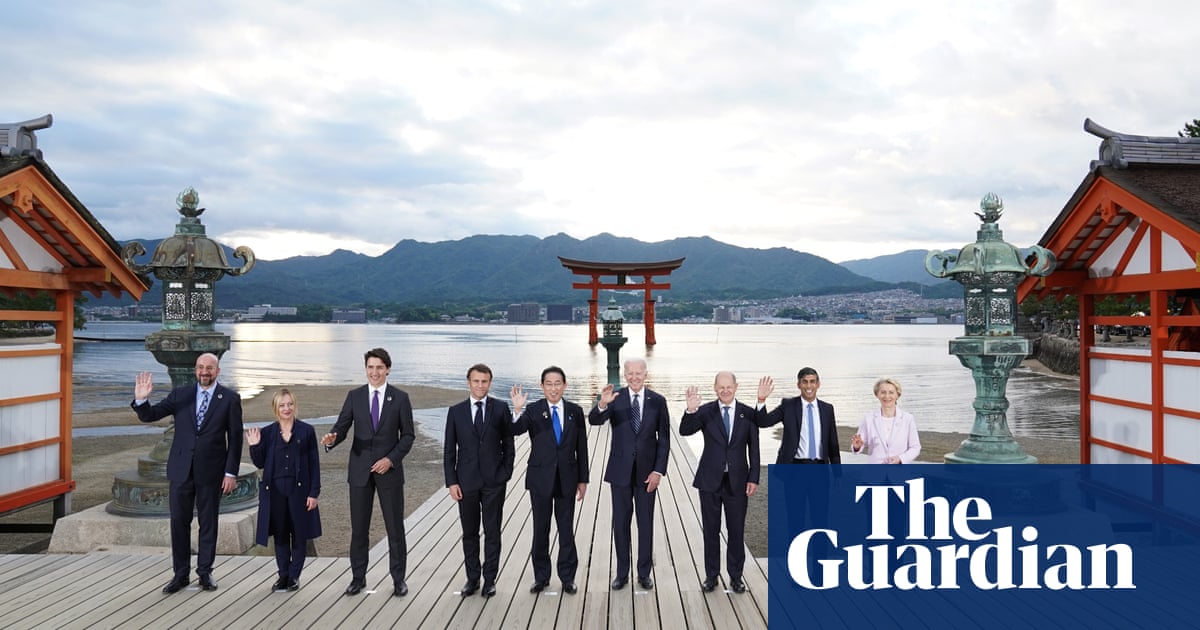
G7 leaders have warned China and North Korea against expanding their nuclear arsenals, as they prepare for the arrival of the Ukrainian president, Volodymyr Zelenskiy.
The war in Ukraine has dominated discussions in Hiroshima, with Zelenskiy set to arrive in the city late on Saturday, a day after the White House announced it would permit allied countries to supply Ukraine with US-built F-16 fighter planes.
Zelenskiy described the decision as “historic”, adding that he looked forward to “discussing the practical implementation” in Hiroshima.
Russia’s war in Ukraine has raised fears that China, which has been increasing its nuclear arsenal, could be emboldened to invade Taiwan. Beijing regards the island as a renegade province and has threatened to bring it under its control, by force if necessary.
A crisis in the Taiwan strait – a vitally important trading route – would create havoc for the global economy and possibly lead to a wider conflict.
Taiwan’s president, Tsai Ing-wen, said on Saturday that the island would not provoke China or bow to pressure from Beijing.
“War is not an option. Neither side can unilaterally change the status quo with non-peaceful means,” Tsai said in a speech to mark her seventh year in office. “Maintaining the status quo of peace and stability is the consensus for both the world and Taiwan.”
On Saturday, G7 leaders also agreed on a new initiative to counter economic coercion and pledged action to deter “actors” – widely believed to include China – from weaponising economic dependence.
“The world has encountered a disturbing rise in incidents of economic coercion that seek to exploit economic vulnerabilities,” they said in a statement that also committed the G7 to deepen cooperation on hardening supply chains and called for a bigger role for lower income countries in promoting economic resilience.
“Supply chain disruptions have had devastating impact for developing, emerging, and advanced economies alike,” they said, and urged countries to adhere to the principles of “transparency, diversification, security, sustainability, and trustworthiness and reliability” in building supply chain networks.
Earlier on Saturday, the leaders warned that China’s “accelerating buildup of its nuclear arsenal without transparency [or] meaningful dialogue poses a concern to global and regional stability”.
Despite those concerns, they underlined the importance of engaging with the world’s second-biggest economy. “We do not seek to thwart China’s economic progress and development,” they said in a draft of the final communiqué leaked to the media.
Saturday’s statement urged North Korea to abandon its nuclear weapons programme, “including any further nuclear tests or launches that use ballistic missile technology. North Korea cannot and will never have the status of a nuclear-weapon state” under international nuclear treaties.
The regime in Pyongyang has dramatically improved its ballistic missile technology, despite years of UN-led sanctions designed to frustrate its ability to develop weapons of mass destruction. It is now believed to possess weapons that are theoretically capable of striking the US mainland, while speculation is rising that it is preparing to conduct what would be its seventh nuclear test.
The leaders’ attention will again turn to Ukraine when Zelenskiy arrives after speaking to an Arab League summit in Saudi Arabia earlier on Saturday. On Friday, the G7 announced a new raft of sanctions targeting the Kremlin and reiterated its unwavering support for Kyiv in the face of Russia’s “illegal, unjustifiable and unprovoked war of aggression”.
Biden was “looking forward” to meeting Zelenskiy at the summit, which began on Friday with a group visit to a museum devoted to the horrors of the US atomic bombing of the city at the end of the second world war. The leaders later laid wreaths and observed a moment’s silence at a memorial to the hundreds of thousands of people who died as a result of the attack.
“It’s a safe bet that President Biden will meet [Zelenskiy]”, the US national security advisor, Jake Sullivan, said. “The president looks forward to the opportunity to be able to sit down face-to-face.”
Sullivan said the F-16 transfers would not upset the key balance Washington wanted in supporting Ukraine “in a way that avoids world war three”.
“The United States is not enabling or supporting attacks on Russian territory,” he said, “and the Ukrainians have consistently indicated that they are prepared to follow through on that.”
Zelenskiy’s visit will also give him a rare opportunity to speak to the leaders of powerful non-aligned countries, including Brazil and India, who have declined to condemn Russia’s invasion.
Japan’s foreign ministry said Zelenskiy would participate in Ukraine talks with G7 leaders on Sunday and attend a session on “peace and stability” that will also include invited non-member countries.
Agencies contributed reporting


